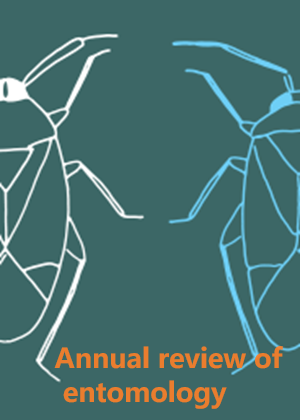Ecology and Evolution of Insect-Fungus Mutualisms.
IF 15
1区 农林科学
Q1 ENTOMOLOGY
引用次数: 127
Abstract
The evolution of a mutualism requires reciprocal interactions whereby one species provides a service that the other species cannot perform or performs less efficiently. Services exchanged in insect-fungus mutualisms include nutrition, protection, and dispersal. In ectosymbioses, which are the focus of this review, fungi can be consumed by insects or can degrade plant polymers or defensive compounds, thereby making a substrate available to insects. They can also protect against environmental factors and produce compounds antagonistic to microbial competitors. Insects disperse fungi and can also provide fungal growth substrates and protection. Insect-fungus mutualisms can transition from facultative to obligate, whereby each partner is no longer viable on its own. Obligate dependency has (a) resulted in the evolution of morphological adaptations in insects and fungi, (b) driven the evolution of social behaviors in some groups of insects, and (c) led to the loss of sexuality in some fungal mutualists. Expected final online publication date for the Annual Review of Entomology, Volume 65 is January 7, 2020. Please see http://www.annualreviews.org/page/journal/pubdates for revised estimates.昆虫-真菌共生关系的生态学和进化。
互惠共生的进化需要相互作用,一个物种提供另一个物种无法提供或效率较低的服务。昆虫-真菌互惠互利交换的服务包括营养、保护和传播。在本综述的重点外共生体中,真菌可以被昆虫消耗,或者可以降解植物聚合物或防御化合物,从而为昆虫提供基质。它们还可以抵御环境因素,并产生对抗微生物竞争对手的化合物。昆虫传播真菌,还可以提供真菌生长基质和保护。昆虫-真菌共生体可以从兼性转变为专性,从而使每个伴侣不再独立生存。义务依赖(a)导致了昆虫和真菌形态适应的进化,(b)驱动了一些昆虫群体的社会行为的进化,以及(c)导致了一些真菌共生体的性取向丧失。《昆虫学年度评论》第65卷预计最终在线出版日期为2020年1月7日。请参阅http://www.annualreviews.org/page/journal/pubdates用于修订估算。
本文章由计算机程序翻译,如有差异,请以英文原文为准。
求助全文
约1分钟内获得全文
求助全文
来源期刊

Annual review of entomology
生物-昆虫学
CiteScore
45.70
自引率
0.80%
发文量
46
期刊介绍:
The Annual Review of Entomology, a publication dating back to 1956, offers comprehensive reviews of significant developments in the field of entomology.The scope of coverage spans various areas, including:biochemistry and physiology, morphology and development, behavior and neuroscience, ecology, agricultural entomology and pest management, biological control, forest entomology, acarines and other arthropods, medical and veterinary entomology, pathology, vectors of plant disease, genetics, genomics, and systematics, evolution, and biogeography.
 求助内容:
求助内容: 应助结果提醒方式:
应助结果提醒方式:


